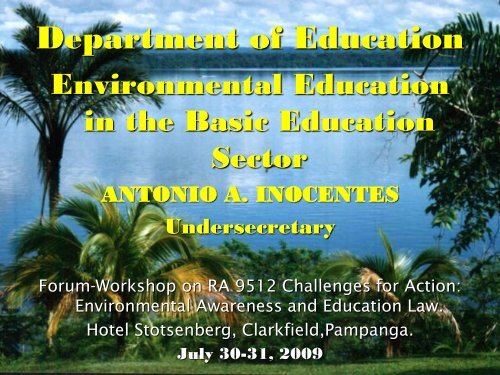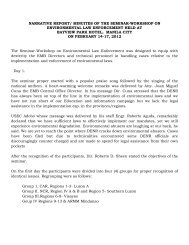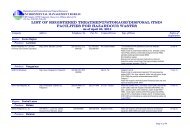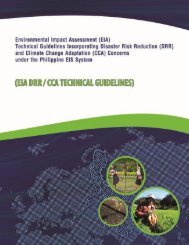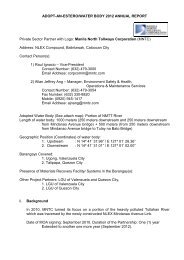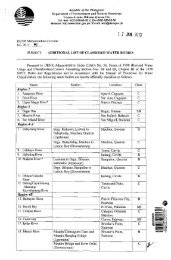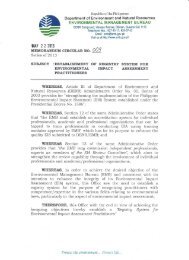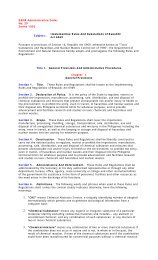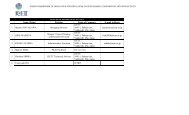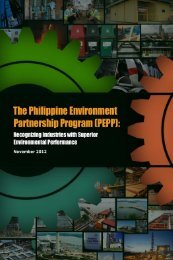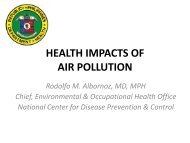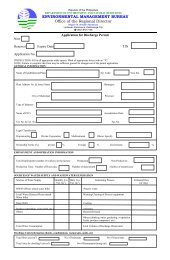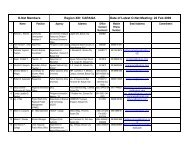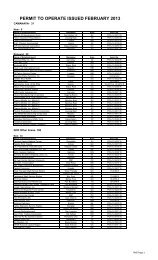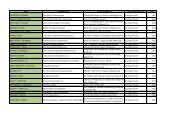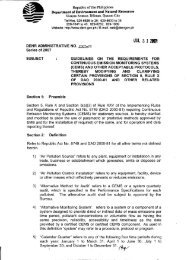Department of Education - Environmental Management Bureau
Department of Education - Environmental Management Bureau
Department of Education - Environmental Management Bureau
Create successful ePaper yourself
Turn your PDF publications into a flip-book with our unique Google optimized e-Paper software.
<strong>Department</strong> <strong>of</strong> <strong>Education</strong><br />
<strong>Environmental</strong> <strong>Education</strong><br />
in the Basic <strong>Education</strong><br />
Sector<br />
ANTONIO A. INOCENTES<br />
Undersecretary<br />
Forum-Workshop on RA 9512 Challenges for Action:<br />
<strong>Environmental</strong> Awareness and <strong>Education</strong> Law.<br />
Hotel Stotsenberg, Clarkfield,Pampanga.<br />
July 30-31, 2009
Legal Bases<br />
1. Article II, Section 16 <strong>of</strong> the 1987 Philippine<br />
Constitution<br />
“The state shall protect and enhance the right <strong>of</strong> the people to<br />
a balanced and healthful ecology in accord with the rhythm<br />
and harmony <strong>of</strong> nature.”<br />
2. Presidential Decree 1152 otherwise known as<br />
the Philippine <strong>Environmental</strong> Code<br />
Title IV. Miscellaneous Provisions<br />
Section 53. <strong>Environmental</strong> <strong>Education</strong><br />
“The <strong>Department</strong> <strong>of</strong> <strong>Education</strong> and Culture shall integrate<br />
subjects on Environment <strong>Education</strong> in its school curricular at<br />
all levels. It shall also endeavor to conduct special<br />
community education emphasizing the relationship for man<br />
and nature as well as environmental sanitation and<br />
practices.”
3. UN – Decade <strong>of</strong> <strong>Education</strong> for Sustainable<br />
Development<br />
• requires involvement <strong>of</strong> all education in<br />
government, civil society, educational<br />
institutions and private organization<br />
4. Philippine Agenda 21: the nation’s<br />
blueprint for sustainable development per<br />
Memorandum Order No. 399 dated<br />
September 26, 1996<br />
and now;
5. RA 9512: An Act to Promote<br />
<strong>Environmental</strong> Awareness through<br />
<strong>Environmental</strong> <strong>Education</strong> and for other<br />
purposes
<strong>Environmental</strong> <strong>Education</strong><br />
a. Development <strong>of</strong> skills, knowledge and<br />
values that promote behavior in support<br />
<strong>of</strong> a sustainable environment.<br />
b. A learning process that increases people’s<br />
knowledge and awareness about the<br />
environment and associated challenges<br />
c. Organized efforts to teach about how<br />
natural environments functions and<br />
particularly how human beings manage it.
<strong>Environmental</strong> <strong>Education</strong><br />
Concepts/Concerns<br />
Climate Change Adaptation<br />
• Air Quality <strong>Management</strong><br />
• Waste <strong>Management</strong><br />
• Ecological Balance<br />
• Global Warming<br />
• Ozone Layer Depletion<br />
Natural Resources <strong>Management</strong> and Conservation<br />
• Water Quality <strong>Management</strong><br />
• Land Use <strong>Management</strong>
With <strong>Environmental</strong> <strong>Education</strong>…<br />
1. Prevention <strong>of</strong> destruction <strong>of</strong> the<br />
environment and sustainable development<br />
achieved;<br />
2. Preservation and protection ecological<br />
foundation <strong>of</strong> the earth<br />
3. Better general public awareness and<br />
understanding <strong>of</strong> concerns like ozone<br />
layer depletion, global warming; leading<br />
to actions
Basic <strong>Education</strong> Sector’s Initiatives<br />
1. Enhancing the Basic <strong>Education</strong> Curriculum<br />
through the development <strong>of</strong> support<br />
instructional materials for the different<br />
learning areas in all levels.<br />
2. Providing support to the conduct <strong>of</strong><br />
celebrations, in programs and observance<br />
<strong>of</strong> sustained efforts for the protection <strong>of</strong><br />
the country’s environment and resources.
3. Establishing linkages with government agencies<br />
and private, and non-pr<strong>of</strong>it organizations for the<br />
upgrading <strong>of</strong> teachers’ competencies in<br />
integrated environmental education<br />
4. Holding <strong>of</strong> science fairs and science camps as<br />
alternative awareness in learning about the<br />
environment.<br />
5. Issuance <strong>of</strong> policies in support <strong>of</strong> environmental<br />
education programs.
d. DepEd Memo No. 56, s. 2002 – Essay and Poster<br />
Contest <strong>of</strong> the Children <strong>of</strong> the Earth’s Club<br />
e. Issuance <strong>of</strong> policies and guidelines on the<br />
integration <strong>of</strong> <strong>Environmental</strong> <strong>Education</strong> in the<br />
curriculum<br />
• Advocacy- Zero Waste <strong>Management</strong>,<br />
• War on Waste (WOW), etc.<br />
• Tree Planting, Cleanliness Campaign<br />
• <strong>Environmental</strong> Care & Protection<br />
• Various Contest on <strong>Environmental</strong> Awareness<br />
F. Theme in SY 2008-2009 National Schools Press<br />
Conference (NSPC)<br />
• - Climate Change: A Call for Responsible Campus<br />
Journalism
DepEd’s Issuances/Policies<br />
6. DepEd Memoranda / Orders<br />
a. Pledge – Panunumpa sa Watawat<br />
b. DepEd Memo No. 234 s. 2008 – Planting <strong>of</strong><br />
Malunggay Trees in School<br />
c. DepEd Memo No. 2 s. 2009 – Dissemination<br />
<strong>of</strong> Republic Act No. 9512 (An Act to Promote<br />
<strong>Environmental</strong> Awareness through<br />
<strong>Environmental</strong> <strong>Education</strong> and for Other<br />
Purposes)
Initiatives: Elementary <strong>Education</strong><br />
Sector<br />
1. Enhanced Curriculum with<br />
environmental concepts in the<br />
following learning areas:<br />
- Science & Health - Gr. III-IV<br />
- Sibika at Kultura – Gr. I-III<br />
- Heograpiya, Kasaysayan at<br />
Sibika - IV-VI<br />
- Edukasyong Pagpapakatao I-VI<br />
- Edukasyong Pantahanan at<br />
Pangkabuhayan IV-VI
1.2. Existing Support Materials with<br />
integration <strong>of</strong> <strong>Environmental</strong><br />
<strong>Education</strong> (EE):<br />
- Lesson Exemplars<br />
- Modules<br />
- Multi-level Materials
Examples<br />
<strong>of</strong> Enhanced/Integration<br />
<strong>of</strong> EE in the<br />
Curriculum
Science and Health<br />
Grade III<br />
• Infer how pollution affects soil,<br />
water, and air<br />
• Practice ways <strong>of</strong> protecting and<br />
conserving soil, water, and air<br />
Grade IV<br />
• Practice precautionary measures in<br />
using, storing and disposing<br />
household materials
Sibika at Kultura<br />
Grade I<br />
• Nakatutulong sa pagpapanatili ng<br />
kagandahan ng tanawin at pook pasyalan<br />
Grade II<br />
• Nailalarawan ang kapaligiran ng sariling<br />
pamayanan at iba pang pamayanang Pilipino<br />
Grade III<br />
• Napapatunayan na mahalaga ang<br />
pagtutulungan upang matamo ang mithiin sa<br />
paaralan at pamayanan<br />
( Programang”Clean and Green”, Waste<br />
<strong>Management</strong>”, “Bantay Kalikasan,” “<br />
Kontra Kalat sa Dagat”)
Edukasyong Pagpapakatao<br />
Grade II<br />
Kalusugan at Pag-ayon sa Kalikasan<br />
• Naisasagawa nang palagian ang<br />
pagtulong sa pagpapanatili ng<br />
kalinisan at kaayusan ng tahanan<br />
- pagtatapon ng basura<br />
Grade III<br />
• Nakatutulong sa pagpapanatiling<br />
ligtas sa sakit ang mga tao sa<br />
pamayanan<br />
- pag-iwas sa pagbili ng pagkaing
Edukasyong Pantahanan at<br />
Pangkabuhayan<br />
Grade V<br />
Agrikultura<br />
• Napapalawak ang mga kaalaman,<br />
kasanayan at wastong saloobin sa<br />
pagtatanim ng gulay na<br />
mapagkakakitaan<br />
• Naipakikita ang hakbang sa<br />
paggawa ng “compost/basket<br />
composting” at wastong paggamit
Initiatives: Secondary <strong>Education</strong> Sector<br />
1. Integration<br />
• Science<br />
• Social Studies<br />
• Values <strong>Education</strong><br />
• Technology and Livelihood <strong>Education</strong> (TLE)<br />
• Music, Arts, Physical <strong>Education</strong> and Health<br />
(MAPEH)<br />
• English & Filipino (use <strong>of</strong> stories, poems, essays)<br />
2. Earth and <strong>Environmental</strong> <strong>Education</strong> is taught as a<br />
separate subject in special science high schools.
3. Examples<br />
Science and Technology III<br />
‣ Discuss the chemical processes involved in<br />
environmental pollution<br />
‣ Describe the biological and environmental <strong>of</strong><br />
colloids like aerosol sprays, smoke, etc.<br />
Araling Panlipunan III<br />
‣ Nasusuri ang kaugnayan ng heograpiya sa mga<br />
pandaigdigang “phenomenon” (Global warming,<br />
El Nino, at iba pa).<br />
‣ Nasusuri ang mga isyu at suliraning may<br />
kinalaman sa paggamit ng teknolohiya (isyu at<br />
suliraning ekolohikal, paglilipat ng teknolohiya,<br />
atbp.)
• Mathematics II<br />
Coordinate System<br />
‣ Indigenous practices and environmentallysound<br />
technologies can lead to mitigation and<br />
adaptation responses to climate change<br />
• Filipino II<br />
Mga Gawain ng Tao Kaugnay sa Pagbabago ng Klima<br />
(Nakakadagdag sa pagtaas ng Greenhouse Gases):<br />
• malawakang/pandaigdigang<br />
deporeystasyon;<br />
• pagdami ng mga gawaing pang-industriyal,<br />
usok mula sa mga sasakyan; at<br />
• pamamahala sa gawaing pagtatapon ng<br />
basura at masidhing pang-agrikultura.
Initiatives: Alternative Learning System<br />
Five Learning Strands<br />
Communication Skills<br />
Problem Solving and<br />
Critical Thinking<br />
(scientific literacy and<br />
numeracy)<br />
Sustainable Use <strong>of</strong><br />
Resources and<br />
Productivity<br />
Development <strong>of</strong> Self and a<br />
Sense <strong>of</strong> Community<br />
Expanding One’s World<br />
22
Learning Strand Two:<br />
CRITICAL THINKING AND PROBLEM SOLVING<br />
Focus:<br />
Application <strong>of</strong> Scientific Ways <strong>of</strong><br />
Thinking in Daily Life<br />
Terminal Objective A:<br />
Acquire scientific thinking skills<br />
through exposure to and<br />
practice in problem solving in<br />
different life situations
<strong>Environmental</strong> <strong>Education</strong> as reflected in the different<br />
Alternative Learning System (ALS) programs<br />
13 BLLMs (Basic Literacy<br />
Learning Materials)<br />
for Non-literate and neo-literate<br />
The BLLMs are translated into 10<br />
major languages:<br />
Ilocano, Pangasinense,<br />
Kapampangan, Bicolano, Cebuano,<br />
Hiligaynon, Waray, Maguindanaon,<br />
Maranao and Tausug.<br />
Kapaligiran Natin:<br />
Alagaan Natin<br />
B a s i c L i t e r a c y L e a r n i n g<br />
M a t e r i a l<br />
B u r e a u o f A l t e r n a t i v e<br />
L e a r n i n g S y s t e m<br />
Sulong Kalikasan,<br />
Pasiring sa<br />
Kauswagan
Elementary Level<br />
4 Modules<br />
Secondary Level<br />
5 Modules<br />
Elementary<br />
Level<br />
25
Radio-Based Instruction (RBI)<br />
4 <strong>of</strong> the A&E core modules<br />
were transformed into<br />
scripts<br />
– Hangin . . . Pumapatay<br />
– Sa Kompost . . . Walang<br />
Gastos<br />
– Bulate, Sagot sa Basura<br />
– Basura’y Bawas-bawasan
Computer-Based Instruction<br />
(CBI) for eSkwela<br />
9 <strong>of</strong> the A&E Core Modules were converted into<br />
digitized form<br />
<strong>Environmental</strong> Causes <strong>of</strong> Diseases<br />
Let’s Clean Up the Environment<br />
Wanted: Clean and Fresh Air<br />
The Cost <strong>of</strong> <strong>Environmental</strong> Degradation<br />
Using Scientific Method in Agriculture<br />
The Ecosystem<br />
Balance in Nature<br />
Think Green<br />
Composting
Agta<br />
Ayta<br />
Isneg<br />
28
Adaption/Translation <strong>of</strong> Package Learning<br />
Materials on Environment (PLANET) for<br />
sustainable development.<br />
PLANET has three series <strong>of</strong> package on three<br />
environmental issues:<br />
• Water Pollution (PLANET 1)<br />
• Forest Conservation (PLANET 2)<br />
• Waste <strong>Management</strong> (PLANET 3)
Practical Application: Best Practices<br />
1. Campaign for a smoke-free and drug-free school<br />
2. Camping on Environment Health and Sanitation<br />
3. Rehabilitation <strong>of</strong> Campus Grounds<br />
4. Annual Search for Best Science Community<br />
Based Project (Preservation and Protection <strong>of</strong><br />
the Environment) like Adopting a River, a<br />
Mountain.<br />
5. Conduct <strong>of</strong> the Annual Regional Youth for<br />
Environment Summer Camp (Provision for<br />
learning experiences and exposure students and<br />
teachers on various scientific, technological and<br />
environmental concepts)
6. National Science Club Month Celebration,<br />
School Level (tree planting, advocacy<br />
program, waste management trainings)<br />
7. Zero Waste <strong>Management</strong>/Solid Waste<br />
<strong>Management</strong><br />
(Composting,<br />
Vermicomposting and Green Manuring)<br />
8. Coastal Clean-up Drive<br />
9. Active participation in the observance <strong>of</strong><br />
the Earth Day
• Funding support<br />
• Development and reproduction <strong>of</strong><br />
learning materials<br />
• Enhancement <strong>of</strong> trainings on<br />
environmental education<br />
• Sustainability <strong>of</strong> programs, projects and<br />
actions
This <strong>Department</strong> to continue playing a<br />
lead role in ensuring the<br />
protection/conservation <strong>of</strong> the<br />
environment through education<br />
initiatives.
1.Continuous partnership with<br />
agencies and institutions in<br />
promoting and developing <strong>of</strong><br />
environmentally-literate and<br />
concerned citizens;<br />
2. Better appreciation <strong>of</strong> the<br />
environment through projects like<br />
conservation <strong>of</strong> local resources,
3. Implementation <strong>of</strong> an enhanced<br />
environmental education<br />
curriculum;<br />
4. Provision <strong>of</strong> technical assistance;<br />
and<br />
5. Monitoring and evaluation <strong>of</strong><br />
program implementation.
THANK<br />
YOU!<br />
<strong>Bureau</strong> <strong>of</strong> Elementary <strong>Education</strong>
<strong>Bureau</strong> <strong>of</strong> Secondary <strong>Education</strong>


